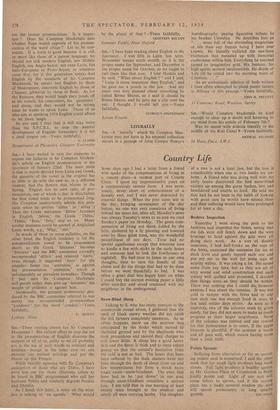Talking to S. who has many contacts in the countryside
round about, I gathered that the spell of bleak snowy weather did not catch the hill farmers completely unawares. As so often happens, snow on the morrow was anticipated by the flocks which moved to sheltered ground and by the shepherds who took precautions and moved their charges to still lower fields. A sheep has a good heavy skin and the fleece is thick and to some extent greasy so that the animal's insulation from the cold is not so bad. The losses that have been suffered by the flock masters .have not been through the death of sheep from icc and low temperatures but from a much more tragic cause—snow-blindness. The ewes that have had to be 'put down' in our area through snow-blindness constitute a serious loss. I am told that in one morning at least twenty were brought to the abattoir and nearly all were carrying lambs. The slaughter of a ewe is not a total loss, but the loss is considerable when one or two lambs are un- born. A friend who was doing well with his early lambs discovered the first snow-blind victims up among the gorse bushes, lost and bewildered and unable to feed. He told me that had he not been in the habit of looking with great care he would have missed them and their suffering would have been prolonged for at least a day.


































 Previous page
Previous page